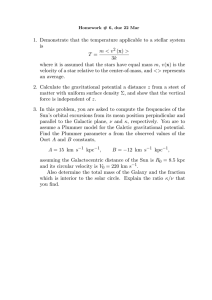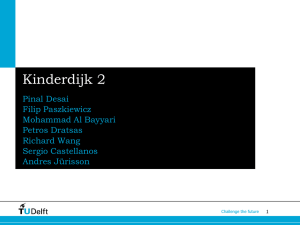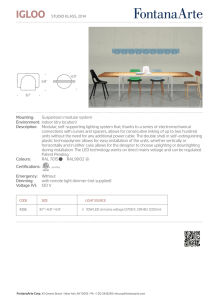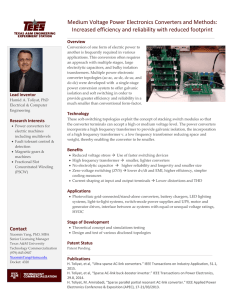The Multi-functional Modular Multilevel Converter Taking a
advertisement
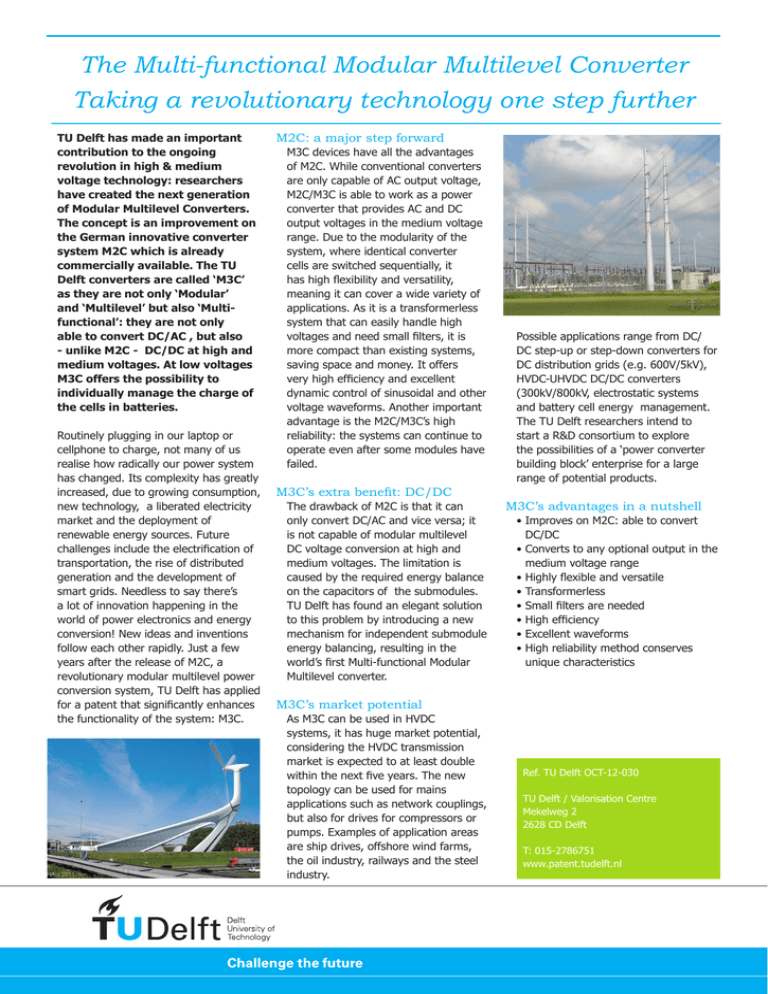
The Multi-functional Modular Multilevel Converter Taking a revolutionary technology one step further TU Delft has made an important contribution to the ongoing revolution in high & medium voltage technology: researchers have created the next generation of Modular Multilevel Converters. The concept is an improvement on the German innovative converter system M2C which is already commercially available. The TU Delft converters are called ‘M3C’ as they are not only ‘Modular’ and ‘Multilevel’ but also ‘Multifunctional’: they are not only able to convert DC/AC , but also - unlike M2C - DC/DC at high and medium voltages. At low voltages M3C offers the possibility to individually manage the charge of the cells in batteries. Routinely plugging in our laptop or cellphone to charge, not many of us realise how radically our power system has changed. Its complexity has greatly increased, due to growing consumption, new technology, a liberated electricity market and the deployment of renewable energy sources. Future challenges include the electrification of transportation, the rise of distributed generation and the development of smart grids. Needless to say there’s a lot of innovation happening in the world of power electronics and energy conversion! New ideas and inventions follow each other rapidly. Just a few years after the release of M2C, a revolutionary modular multilevel power conversion system, TU Delft has applied for a patent that significantly enhances the functionality of the system: M3C. M2C: a major step forward M3C devices have all the advantages of M2C. While conventional converters are only capable of AC output voltage, M2C/M3C is able to work as a power converter that provides AC and DC output voltages in the medium voltage range. Due to the modularity of the system, where identical converter cells are switched sequentially, it has high flexibility and versatility, meaning it can cover a wide variety of applications. As it is a transformerless system that can easily handle high voltages and need small filters, it is more compact than existing systems, saving space and money. It offers very high efficiency and excellent dynamic control of sinusoidal and other voltage waveforms. Another important advantage is the M2C/M3C’s high reliability: the systems can continue to operate even after some modules have failed. M3C’s extra benefit: DC/DC The drawback of M2C is that it can only convert DC/AC and vice versa; it is not capable of modular multilevel DC voltage conversion at high and medium voltages. The limitation is caused by the required energy balance on the capacitors of the submodules. TU Delft has found an elegant solution to this problem by introducing a new mechanism for independent submodule energy balancing, resulting in the world’s first Multi-functional Modular Multilevel converter. Possible applications range from DC/ DC step-up or step-down converters for DC distribution grids (e.g. 600V/5kV), HVDC-UHVDC DC/DC converters (300kV/800kV, electrostatic systems and battery cell energy management. The TU Delft researchers intend to start a R&D consortium to explore the possibilities of a ‘power converter building block’ enterprise for a large range of potential products. M3C’s advantages in a nutshell • I mproves on M2C: able to convert DC/DC • Converts to any optional output in the medium voltage range • Highly flexible and versatile • Transformerless • Small filters are needed • High efficiency • Excellent waveforms • High reliability method conserves unique characteristics M3C’s market potential As M3C can be used in HVDC systems, it has huge market potential, considering the HVDC transmission market is expected to at least double within the next five years. The new topology can be used for mains applications such as network couplings, but also for drives for compressors or pumps. Examples of application areas are ship drives, offshore wind farms, the oil industry, railways and the steel industry. Ref. TU Delft OCT-12-030 TU Delft / Valorisation Centre Mekelweg 2 2628 CD Delft T: 015-2786751 www.patent.tudelft.nl
